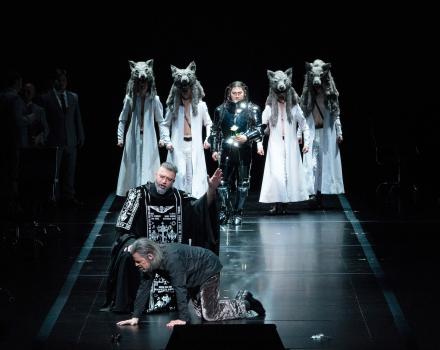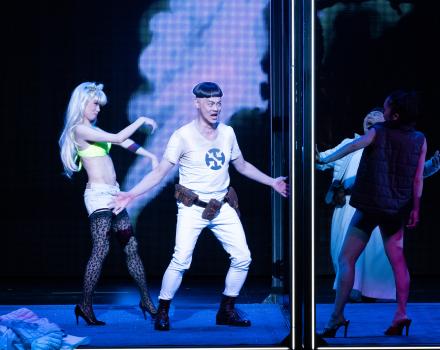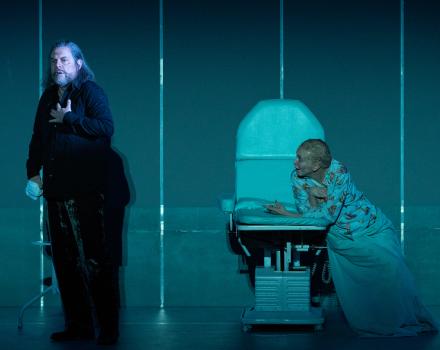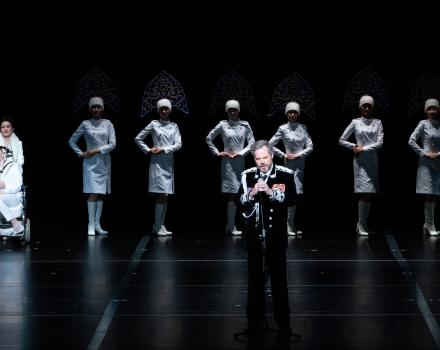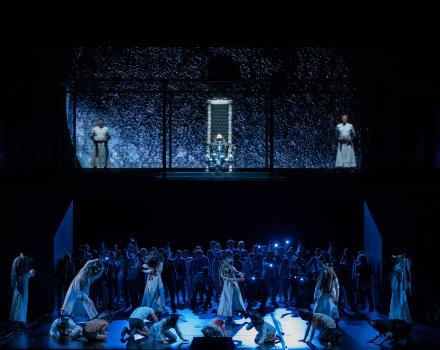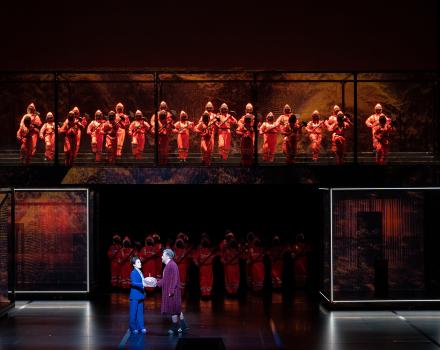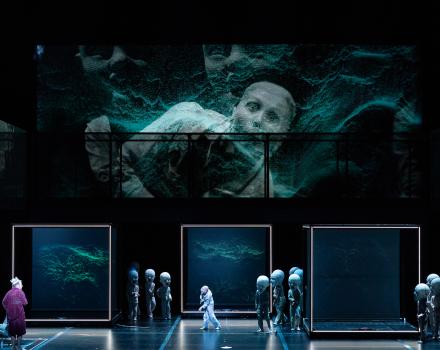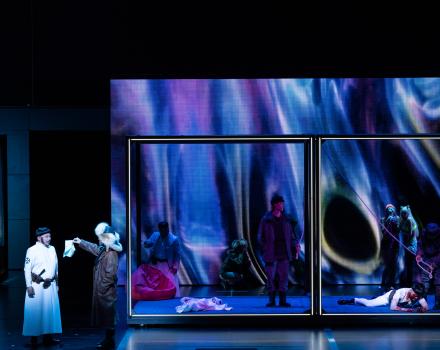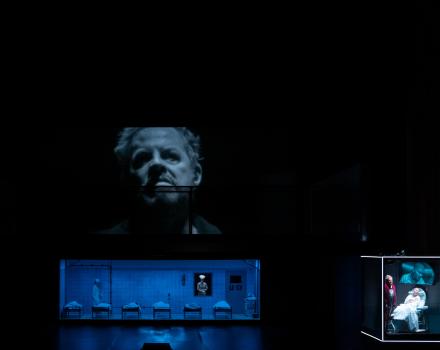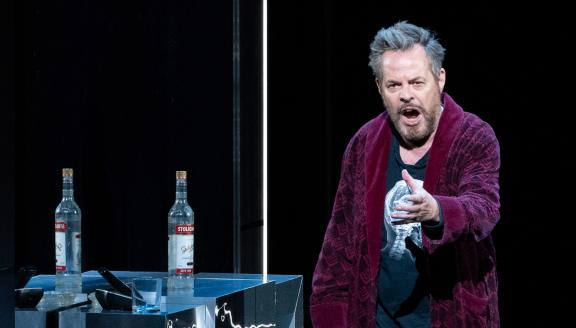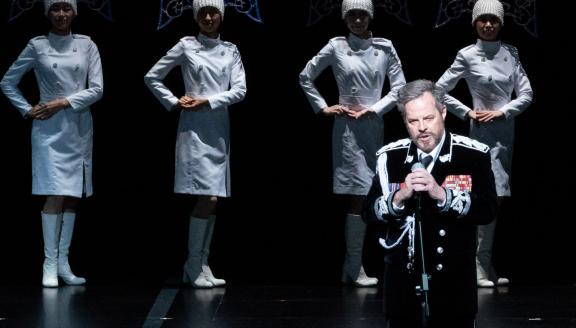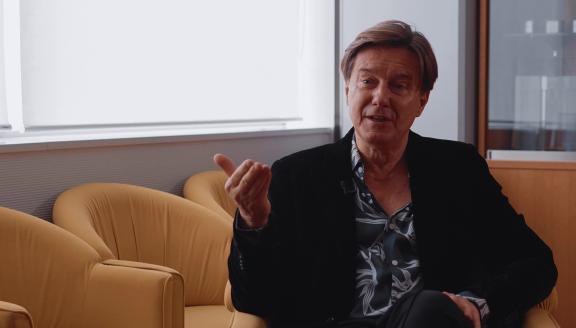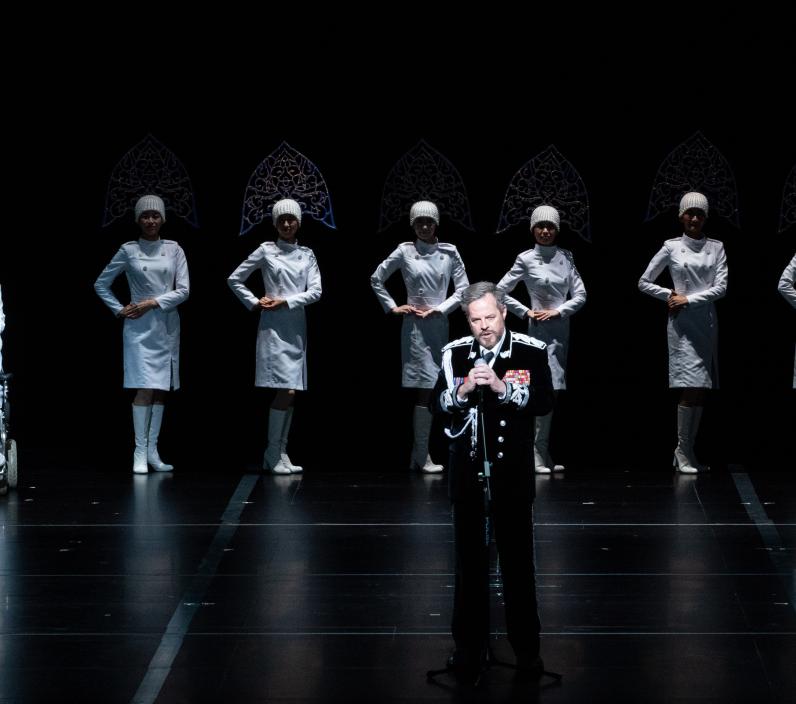
Like Shakespeare’s Macbeth, Boris Godunov is capable of murder in pursuit of power. When Boris’s political opponents substitute a pretend descendant of the previous tsar, the so-called Pretender, to stage a coup d’état, Godunov, tormented by remorse, is certain that it is the reincarnation of his victim who, like an angel of vengeance, has come to take his life.
Based on a play by Aleksandr Pushkin about the real-life Boris Godunov, the opera traces the life of the Russian Regent during the Time of Troubles in the late 16th century, from his coronation to his death. This sombre tragedy is about the cries of a nation, the scheming of those in power and the anguish of Boris himself. The music is richly modern, and filled with innovative harmonies based on Russian folk songs and traditional Russian Orthodox church music, and is considered the pinnacle of Russian opera. This new production from Tokyo is conducted by Kazushi Ono, artistic director of New National Theatre, and directed by Mariusz Treliński, who is artistic director of the Polish National Opera, the co-producer of this production. After a distinguished career in film, Treliński’s work in opera is known for bringing out the essential beauty of the music within a contemporary theatrical aesthetic. With an excellent cast, the drama unfolds around the demise of Boris Godunov, driven into a corner by his own actions. This production combines the 1869 original version and the 1872 revised version of the opera.
Cast
|
Boris Godunov
|
Guido Jentjens
|
|---|---|
|
Fyodor (Feodor)*
|
Eiko Koizumi
|
|
Xenia
|
Kanae Kushima
|
|
Kseniya’s nurse*
|
Mika Kaneko
|
|
Prince Vasiliy Shuysky
|
Arnold Bezuyen
|
|
Andrey Shchelkalov
|
Naoyuki Akitani
|
|
Pimen
|
Goderdzi Janelidze
|
|
The Pretender under the name Grigory
|
Kazuma Kudo
|
|
Varlaam
|
Teppei Kono
|
|
Misail
|
Hideyuki Aochi
|
|
The Innkeeper
|
Kasumi Shimizu
|
|
The Yuródivïy (voice)
|
Tetsutaro Shimizu
|
|
Nikitich, a police officer (Hauptmann)
|
Toshiaki Komada
|
|
Mityukha
|
Hiroaki Otsuka
|
|
The Boyar in attendance (Leibbojar)
|
Takayuki Hamamatsu
|
|
Fyodor - The Yuródivïy (silent role)
|
Justyna Wasilewska
|
|
Chorus
|
New National Theatre Chorus
|
|
Children chorus
|
TOKYO FM Boys Choir
|
|
Orchestra
|
Tokyo Metropolitan Symphony Orchestra
|
| ... | |
|
Music
|
Modest Mussorgsky
|
|---|---|
|
Text
|
Modest Mussorgsky after Boris Godunov by Aleksandr Pushkin
|
|
Conductor
|
Kazushi Ono
|
|
Director
|
Mariusz Treliński
|
|
Sets
|
Boris Kudlička
|
|
Costumes
|
Wojciech Dziedzic
|
|
Lighting
|
Marc Heinz
|
|
Dramaturgy
|
Marcin Cecko
|
|
Video design
|
Bartek Macias
|
|
Choreography
|
Maćko Prusak
|
|
Hair and make-up
|
Waldemar Pokromski
|
|
Chorus master
|
Kyohei Tomihira
|
|
Children chorus master
|
Yuka Hayashi
Kunie Ito
|
| ... | |
*Those two roles are portrayed as Kseniya's friends in this production.
Co-production with Teatr Wielki - Polish National Opera.
VIDEOS
STORY
Prologue
Not long before coronation, Godunov spends his time at the bed of his paralyzed son, Fyodor. Caring for the boy is difficult for both. When Godunov is not with his son, he mentally falls apart. The terrified mind of the ruler imposes a filter of subjective visions on objective events. To his Staff: Shchelkalov, Shuysky, his daughter Xenia and others - he is merciless and aggressive. He does not allow himself to be helped. The Staff explains the ruler’s temporary indisposition to the crowd, but behind his back, everyone but Xenia mocks him. Before accepting the crown Godunov meets with hierarchies. Pimen, the highest hierarch, is a staunch opponent of the ruler. Both play a diplomatic courtesy, Godunov forces himself and kisses Pimen’s ring. Moments later, Godunov in his room has a mysterious vision. We see Uglich, a place where the successor to the throne of the previous dynasty, called Tsarevich, died. Godunov’s speech during the coronation captivates the people. Boris sincerely hopes to end the period of anarchy and chaos in which the country was plunged.
Act 1
Six years later. Pimen subjects his adept monks to manipulation and propaganda. The goal of Pimen’s sect is to take power away from Godunov. He makes one of his adepts, Grigory, believe that he is the reincarnation of Tsarevich, who was murdered by Godunov’s people. Grigory becomes the Pretender. On his way to Godunov, Pretender and two monks stop at a provincial taproom. Entry of a brutal squad of special forces looking for the Pretender ends in a slaughter.
Act 2
Godunov is exhausted after years of ruling. Seeing his daughter in mourning for her fiancé, he feels that not only he has lost, but his entire family too. Fyodor, boasting about his first steps on crutches, spreads a vision of how he will rule in the future. Godunov, hiding his tears, nods in agreement with his son’s illusions. One of Godunov’s close associates, Shuysky, senses the Tsar’s weakness. He manipulates him. They recall events in Uglich. Godunov has a vision of an angelic figure of the vengeance – dead Tsarevich in shining armor, looking like the Pretender.
Act 3
The rebellious parliamentarians believe Pretender’s propaganda. The media coverage shows him as an obscene star - an angel of purification. Parliament, in euphoria, turns against Godunov. Godunov has another nightmare. Murdered children from Uglich surround him. His son Fyodor looks at him with hatred and reproach. He accuses him of the crime and strangles him. There is something terrifying and, at the same time, mystical in the dizziness of his sick body. He is a modern incarnation of the key figure in Russian culture, Yurodivy, a holy fool through whom, as it is claimed, God speaks. In reality, Fyodor has a high fever and is delirious. Godunov and his Staff watch over him. Fyodor continues Yurodivy’s accusation, saying that Godunov butchered Tsarevich.
Act 4
Proceedings of the parliament become a parody of power, the parliamentarians change their minds and are unable to reconcile. Situation changes when Godunov appears. Shadow of a man on the verge of madness, hollowed out by guilt. Shuysky mocks him in front of everyone. Pimen speaks of a specter of the murdered Tsarevich, who, like a relic, heals people. He provokes Godunov, who in a fit of madness confesses his crimes. Pimen triumphs. The Pretender enters the room with an army of wolf monks and brutally murders his master and teacher - Pimen. The parliamentarians panic. The Pretender wounds Godunov and humiliates him by trampling his face. Godunov begs to be allowed a moment alone with his son.
Godunov tells his son of his impending death and apologizes to him. Paralyzed boy understands little. Wanting to spare his son from inhuman brutality of the Pretender, he kills Fyodor himself.
Finale
A sequence of collective execution. The entire parliament is thrown in as groups. The final execution is the murder of Godunov. On the floor above, we watch The Pretender, who stylises himself as a holy savior. He drinks Godunov's blood from the Tsar's chalice, raises it in a gesture of toast and proclaims himself the new Tsar. The Beast is on the throne.
Synopsis by Marcin Cecko, dramaturg.
INSIGHTS
Godunov’s Guilt
Dramaturg Martin Cecko on Boris Godunov
Each time we embark on the work of interpreting an opera with director Mariusz Treliński, we begin by searching for what is true and universal in the work, i.e. what is contemporary. Mariusz needs to deeply understand the characters and their motivations. He has the intuition of a film director, who wants to feel a character, define its core, describe its mystery and extract its emotional truth. To reach this point, we need to challenge the stereotypes and clichés that have accumulated around famous pieces. We began our work on Mussorgsky’s opera by analysing the main arch of the title character, Godunov’s guilt. In the original, it is so immense that it leads him directly to death. For an artist seeking psychological realism, such an event raises many questions. It seems too magical; the stuff of myths. Given Boris’ position, his determination, cunning and political experience, what could have happened in him to make his body decide, against his will, to die of its own accord out of a sense of fear and remorse? Although we knew we did not want to refer to the period-themed productions for which Russian theatres are famous, we conducted detailed historical research.
As a historical figure, Godunov went from a mere nobleman to Ivan the Terrible’s right-hand man through a career of service with the so-called Oprichina, the personal guard of the cruel Tsar Ivan. This small army is said to be responsible for the murders of some 100,000 people, enemies of the ruler, but also civilians, sometimes entire Tatar cities. Long service in such an organisation, in a squadron of murderers, cannot fail to leave a mark on the psyche. We began to see in Godunov a long-growing trauma, which matured and revealed itself just before the moment the opera’s action. It is something that happens among veteran soldiers, known as Post Traumatic Stress Disorder (PTSD). Symptoms of this syndrome include hallucinations, aggression, mood changes and paranoia. Despite efforts, a person experiencing this syndrome cannot distinguish between his own fantasy and the truth. Here is the Godunov we were looking for: complex, fractured, multi-dimensional. This set the tone and style of the whole show. The ancient myth or Shakespearean magic gained a foothold in the psychological truth and biography of the hero, whose only fragment of life we see on stage. The set design follows the idea of Godunov, who is the subject of the story; moving rooms create a labyrinth of his mind. Events appear to Godunov and after a while they scatter like fuzzy memories. He is not sure if the people calling for him to take the crown are his dream or the crowd outside the government headquarters. The murder scene in Uglich materialises literally approaching him.
Godunov’s relationship with his son Fyodor is key. Fyodor is a sick child. Godunov blames himself for this; his actions, like fateful retribution, have brought infirmity onto his son. During moments when Godunov takes care of him, he shows his human face. However, this is an ambivalent relationship. Power is based on inheritance in this story. Godunov knows that he has no descendant who will take the throne after him. In addition to his sickness, Fyodor seems to possess psychic abilities. Here, we have combined the role of Fyodor with the character of Yurodivy, the holy fool, who appears in only one scene of the opera. Yurodivy, a special figure for Russian culture who could say anything with impunity even to the head of state, accuses Godunov of murder. This is a turning point in the story. From that moment, Godunov collapses into himself. He stops fighting. It is all the more painful for him when the accusation falls from the mouth of his own son, who doubles as victim and executioner.
Godunov’s most dangerous adversary is, however, neither his son nor the delusion-inducing remorse, but the fanatic Pimen and his pupil whom he anoints as the heir to the throne - Grigory, who becomes the Pretender. This is the second character in the opera bent on power even if it involves killing on the way. Raised by Pimen’s propaganda and brainwashed, Grigory is convinced that he is the reincarnation of the slain Tsarevich. It was very important for us to show this character as extremely cruel. Two men on opposite sides of the barricade, Pimen and Godunov by their actions bring about an even greater evil. While Godunov has remorse, the Pretender has none; he derives satisfaction from murder. He is a narcissistic figure who, in the finale, reveals himself as the pure beast. He wants to see the world plunge into chaos. The Pretender becomes to us a symbol of a Time of Troubles we might witness today, caused by the irresponsibility of the wrong people in power.
Gallery
